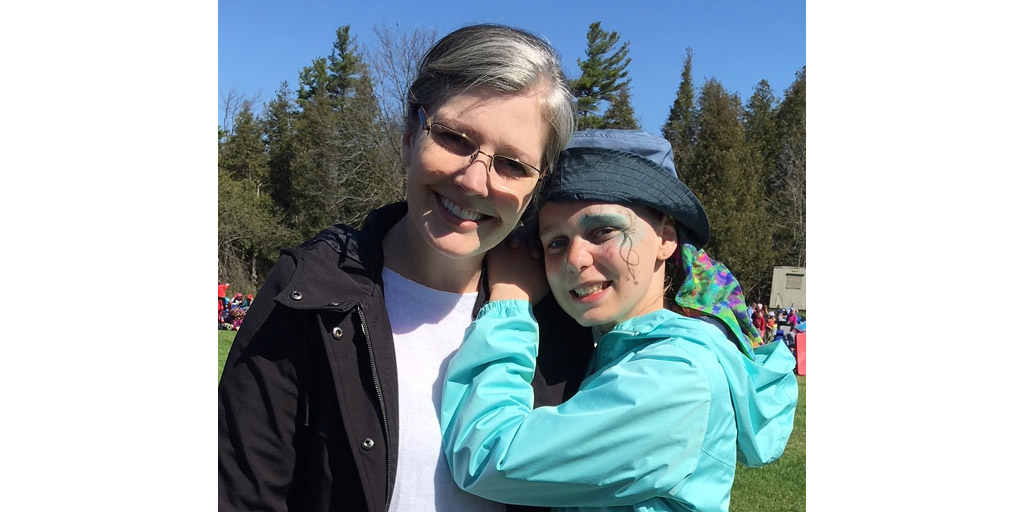Fanshawe professor creates award-winning film based on her struggles with infertility
 CREDIT: KARI TOWNSEND
CREDIT: KARI TOWNSENDFanshawe professor, Kari Townsend (pictured above with her daughter) discussed how her film, Girl of My Dreams, has impacted people struggling with infertility as well as on the topic of adoption.
When Fanshawe professor of communications, Kari Townsend, got married in 1992, she assumed that starting a family would be easy.
“Like most young people at the time, you just think it’s going to happen for you,” Townsend said in a phone interview with Interrobang. “And it didn’t happen right away, in fact I suffered several miscarriages and ultimately we ended up looking into Assisted Reproductive Technology.”
Townsend discussed the toll that invasive procedures, such as In Vitro Fertilization (IVF), took on her body.
“I was very convinced that I would be a wonderful and loving mother, but my body wasn’t playing along,” Townsend said.
Over a decade after she was wed, Townsend received a phone call which changed her life.
“The phone call that brought my daughter into my life was nothing short of a miracle. She literally was the girl of my dreams,” Townsend said.
Her daughter was born on Feb. 21, 2006 and just under a year later, on Jan. 30, 2007, the court notice arrived which approved her adoption.
On that same day Townsend wrote a letter to her daughter for her to read at some point in the future. However, it wasn’t until quite a few years later that Townsend decided to show her love for her daughter in a different way, by making a short film titled Girl of My Dreams.
“I originally wrote this story as a gift to my daughter because I think many parents struggle to adequately express the love they feel for their children and I don’t think that’s something we can understand as children until we are parents,” Townsend said.
While Townsend made the short film as a private gift to her daughter, it was her daughter who encouraged her mother to share the film as a message of hope to other women and families going through the same struggles that she went through.
The film describes the intense procedures and struggles that Townsend experienced, in an attempt to bear children and finally, the adoption of her daughter.
The film emphasises that biology has nothing to do with becoming a parent.
“We have to stop privileging biology, we have to stop seeing adoption as a last resort. It’s our hearts that make us fathers and mothers. My daughter didn’t need to be born of me to be a part of me,” Townsend said.
According to Townsend, the film left an impact on her daughter.
“After [my daughter] watched it, she suggested that we share it with others because she thought that others would benefit from the film’s message as a message of hope, perseverance, and love,” Townsend said.
With her daughter’s support, Townsend released the film for the world to see, hoping to share this message of hope. After the film was released, it gained attention from festivals all over. Through these festivals, Townsend has received five awards for her film, including:
• Award of Recognition, Documentary Short, IndieFEST Film Awards (August 2018)
• Award of Recognition, Women Filmmakers, IndieFEST Film Awards (August 2018)
• Bronze Award, Best Short Film, Mindfield Film Festival - Albuquerque (August 2018)
• Bronze Award, Best Documentary Short, Mindfield Film Festival - Albuquerque (August 2018)
• Gold Award, Best Documentary Short, Royal Wolf Film Awards (September 2018)
“It’s almost like a snowball effect. You receive one of these awards and then suddenly you’re getting invitations from other festivals to submit and then you submit and you’re getting more awards,” Townsend said. “The real benefit of that is that you’re reaching a wider audience, therefore your film is more likely to have an impact which is to share that message of hope.”
Townsend said the awards have been an honour, but have not been the greatest reward of making this film.
“[The awards] have been wonderful, but the greatest award of making and sharing this [film] has been the number of emails, messages and feedback that I’ve received from either prospective parents, or existing parents,” Townsend said. “I even received a message from a man that I don’t know saying that this film had a massive impact on him because he was adopted, but had never considered the struggle his adoptive mother went through.”
Townsend said she is very happy that a film she made on her own could have such a large influence on the audience it reaches.
“I made this film with zero budget, I mean this film literally cost me nothing to make. I had all of the resources and I made it on my Mac [computer],” Townsend said.
One of the resources Townsend did have for the film was the background music, which she had recorded years earlier with the help of Juno Award winner Dan Brodbeck, who’s also the co-ordinator of the Music Industry Arts (MIA) program at Fanshawe.
When asked why she chose to share her story in a film medium, Townsend stated, “I think that films invest in our lives experiences. It values our immediacy, our moments, our triumphs, our tragedies, our failures, and our successes. The film medium preserves us and helps us continue on in hopefully a meaningful way for others”.
Townsend said she hopes that Girl of My Dreams will continue to be shared to offer reassurance to those that are struggling with infertility.
“There’s such a pressure to reproduce biologically. When a celebrity for example, comes out in Hollywood and talks about their struggle, I think that really helps advance our discussion and our understanding and think about becoming parents in very different ways,” Townsend said.
Watch Girl of My Dreams on Vimeo at vimeo.com/278004760.














